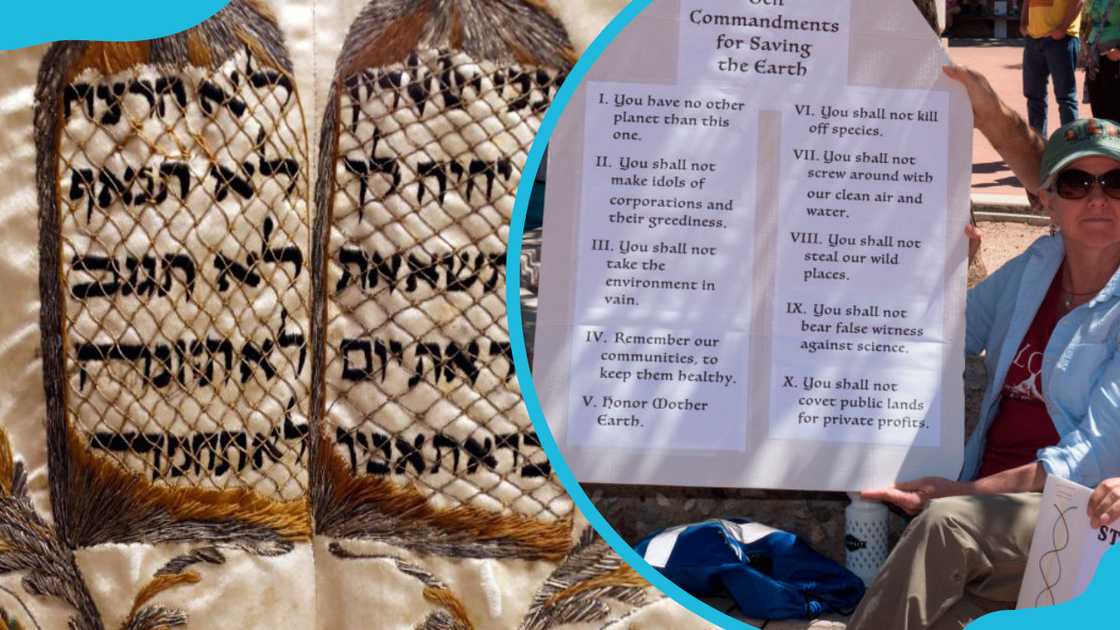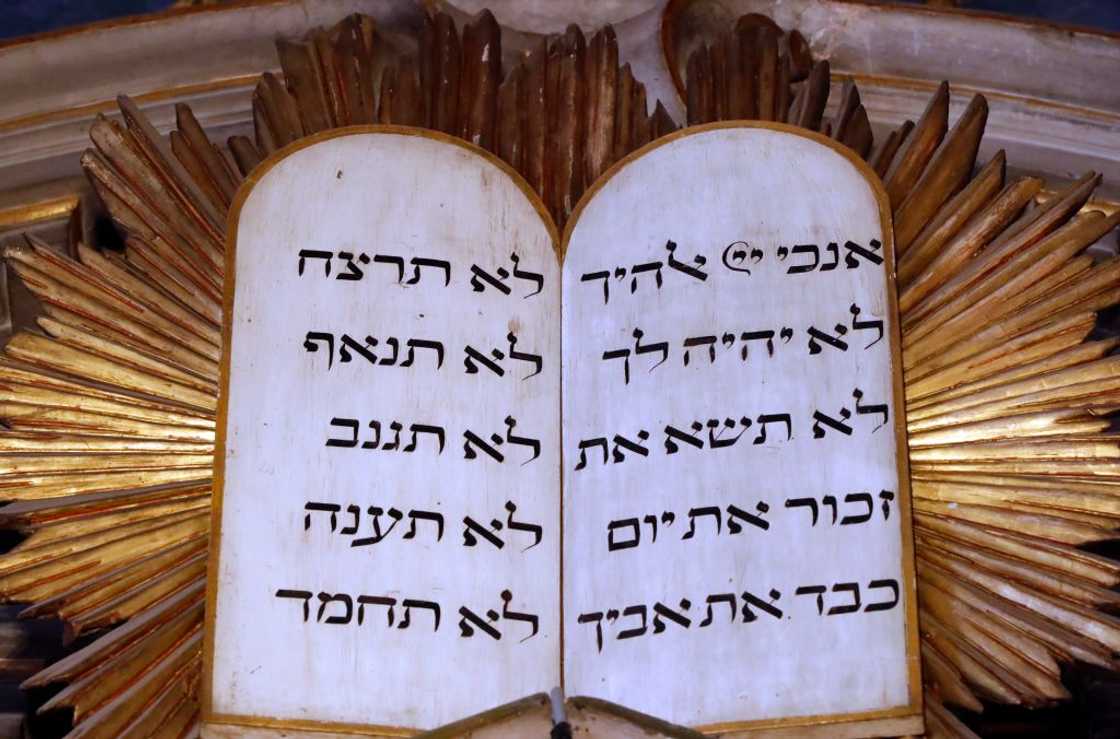The Ten Commandments translated into Ebonics: A creative blend of biblical law and urban expression
Ebonics is an African American Vernacular English (AAVE) with unique grammatical rules and pronunciations. The Ten Commandments, translated into Ebonics, combine sacred biblical law with the lively style of the dialect. This fresh approach makes ancient teachings more relatable to modern urban communities, helping a wider audience connect with scripture.

Source: Getty Images
TABLE OF CONTENTS
- Key takeaways
- The Ten Commandments translated into Ebonics
- What is the alternative name for the Ten Commandments?
- What do Jews call the 10 commandments?
- Are the 10 commandments mistranslated?
- What were the 10 commandments originally called?
- How are the 10 commandments relevant to society today?
- Are the Ten Commandments part of natural law?
- What is the modern significance of the Ten Commandments?
Key takeaways
- Worship just God, no fakes. Jews call it Aseret HaDibrot (Ten Sayings), not mistranslated.
- Don’t make or bow to statues. Ebonics Bible version: “No fake gods, fam.” Also Decalogue.
- Don’t misuse God’s name. Ebonics Bible Psalm 23: “Lord’s my homie, respect His name.”
- Don’t murder, keep peace. “Kill” mistranslated; it means “murder.” Ebonics: “No bodyin’.” Decalogue ethic.
The Ten Commandments translated into Ebonics
A creative rephrasing of the biblical Ten Commandments, originally called Aseret HaDibrot (Ten Sayings) in Hebrew by Jews, into urban, African-American vernacular (Ebonics). This translation uses street-smart, expressive language to convey the divine laws from the Torah, like those in the Ebonics Bible version.

Read also
Man City star Jeremy Doku visits Manhyia, presents special gift to Asantehene Osei Tutu II (Photos)
By putting the Ten Commandments, Psalm 23 ("The Lord is my shepherd"), and John 3:16 ("For God so loved the world") into Ebonics, the message becomes more relatable and easier to connect with for modern audiences. This style also reimagines foundational scriptures like Genesis 1 ("In the beginning, God created the heavens and the earth") in a way that speaks directly to urban culture, blending ancient wisdom with modern voice.
The Ten Commandments translated into Ebonics offer a fresh and culturally engaging way to understand biblical teachings, much like the Ebonics Bible version brings scripture to life using the rich, expressive language of African American communities.
What is Ebonics
The term Ebonics means black speech. It is a blend of the words black and phonic sounds. The term was formulated in 1973 by a group of black scholars who did not like how the language was referred to.
In some instances, people will refer to Ebonics as African American Vernacular English (AAVE). Supporters of the language claim that it has specific grammatical and linguistic rules, and it is not as free or lazy as many presume.
When you analyse the language well, you will realise that it is a combination of African languages and standard English. It has the formal rules of some of the West African languages of Ibo, Yoruba, Ewe, Tula, Mandinka, Wolof, and Mende compared to American English.
Therefore, to have the Ebonics ten commandments is a great achievement for the language that has long been perceived as informal. Even though Ebonics differs grammatically from other forms of English, it is easily understandable.
The Ten Commandments in Ebonics

Source: Getty Images
The Ten Commandments appear in the Old Testament of the Christian Bible and the Jewish scriptures. Jews refer to them as the "Ten Sayings. While there is no officially recognized or standard Bible translation in Ebonics, people have translated some parts into the dialect.
Here is a fun, respectful take on how the Ten Commandments in Ebonics might sound—keeping the spirit but using more relaxed, everyday language:
- Ain’t no other gods but Me, ya heard? — You shall have no other gods before Me.
- Don’t be makin’ no fake gods or statues to worship. — You shall not make for yourself an idol.
- Don’t be usin’ My name like it don’t mean nothin’. — You shall not take the name of the Lord your God in vain.
- Keep yo’ rest day holy — chill out and honour Me. — Remember the Sabbath day, to keep it holy.
- Respect ya mama and daddy, so you can live long and good. — Honour your father and your mother.
- Don’t be out here killin’ folks. — You shall not murder.
- Don’t be messin’ around with somebody else’s boo. — You shall not commit adultery.
- Don’t be takin’ stuff that ain’t yours. — You shall not steal.
- Don’t belying’ to people. — You shall not bear false witness against your neighbour.
- Don’t be gettin’ jealous of what other folks got. — You shall not covet anything that belongs to your neighbour.
There you have it, the ten commandments in Ebonics. If you are familiar with the language, you have probably noticed some familiar terms and now better understand them in a simpler language.
The Ebonics 10 commandments are a great testament to how the Bible is the most translated book globally. There are possibly numerous other translation instances that are yet to be officially captured to get the Holy Book's dialects' true account.
What is the alternative name for the Ten Commandments?
The alternative name for the Ten Commandments is the Decalogue. This term, derived from the Greek words deka (ten) and logos (word), literally means "ten words" or "ten statements." It is used in Christian and scholarly contexts to refer to the set of divine laws given by God to Moses on Mount Sinai, as recorded in the Torah (Exodus 20:1-17 and Deuteronomy 5:6-21).
What do Jews call the 10 commandments?
Jews call the Ten Commandments Aseret HaDibrot, which is Hebrew for "Ten Sayings" or "Ten Statements." This term comes from the Torah, specifically Exodus 34:28 and Deuteronomy 4:13, where they are referred to as the "ten words" (aseret hadvarim).

Read also
Sammy Kuffour, Kwame Despite, and East Legon’s rich men enjoy Chelsea’s Club World Cup win: Video
Are the 10 commandments mistranslated?

Source: Getty Images
The Ten Commandments, known in Hebrew as Aseret HaDibrot ("Ten Sayings") and alternatively as the Decalogue, are not broadly mistranslated in most English Bible versions. Some specific nuances and terms can lead to misinterpretations or loss of original meaning.
What were the 10 commandments originally called?
The Ten Commandments were originally called the “Decalogue,” which comes from the Greek words deka (ten) and logos (words), meaning “Ten Words” or “Ten Sayings.” In the Hebrew Bible (Old Testament), they are referred to as “Aseret ha'Dibrot” (עֲשֶׂרֶת הַדִּבְּרוֹת), which also means “Ten Sayings” or “Ten Statements.”
They are found in the books of Exodus 20 and Deuteronomy 5 in the Bible.
How are the 10 commandments relevant to society today?
The Ten Commandments remain relevant today by promoting basic moral values like honesty, respect, and responsibility. They encourage people to live peacefully, respect others’ rights, and build stronger communities. Many modern laws and social norms reflect these timeless principles.
Are the Ten Commandments part of natural law?
Yes, parts of the Ten Commandments are considered natural law. Moral rules like “do not kill” or “do not steal” reflect universal human values found in many cultures. However, religious commands about worship are seen as divine law rather than natural law.
In his 1993 encyclical Veritatis Splendour, Pope John Paul II attributes to St. Thomas Aquinas the seemingly innocuous statement that, " ... the [ten] commandments contain the whole natural law.
"Both the 'Vatican' English Translation and the original Latin text cite the Summa Theologicae I-II, q
What is the modern significance of the Ten Commandments?
The Ten Commandments influence the laws, ethics, and cultural values. Many legal systems, especially in Western societies, draw foundational principles like justice, respect for life, and personal responsibility from them.
They also serve as a moral compass, offering timeless guidance on how to treat others and live with integrity. Beyond religion, the Commandments symbolise universal values like honesty, respect, and community responsibility that resonate with people of various backgrounds today.
While the Ten Commandments translated into Ebonics offers accessibility, connectivity, and better understanding of the holy book by many communities, there are risks of misinterpretation of the scripture during translation. It is therefore not recommended to solely rely on the Ebonics translation, but always compare across various versions.
Yen.com.gh recently published an article about the Methodist Church Ghana's history and structure. The Methodist Church in Ghana is one of the oldest Protestant churches.
The Methodist Church in Accra, Ghana, has many branches. The church has a total membership of over 500,000. Click on the link above to learn more!
Source: YEN.com.gh

Simon Ayub (Project Manager) Simon Ayub is an adept content strategist and writer who generates content mainly focusing on the Facts and Life Hacks category. With over half a decade of creating relatable content for various brands, Simon has amassed sufficient knowledge to give every website a palpable spark – ample precedence for an ever-growing audience. Simon holds a BSc in Agricultural Economics and is a Certified Public Accountant. He studied SEO tactics and analytics out of his love for writing.

Kevin Omuya (Lifestyle writer) Kevin Omuya is a professional content writer with over three years of experience. At Legit.ng, he has contributed to extensive research on various topics such as celebrity news, fashion, and biographies. He has also worked as an editor and content creator at SportsCulture and CottageMed. In 2019, he graduated with a Bachelor of Arts in Journalism & Digital Media from KCA University. You can reach him through his email: komuya89@gmail.com




